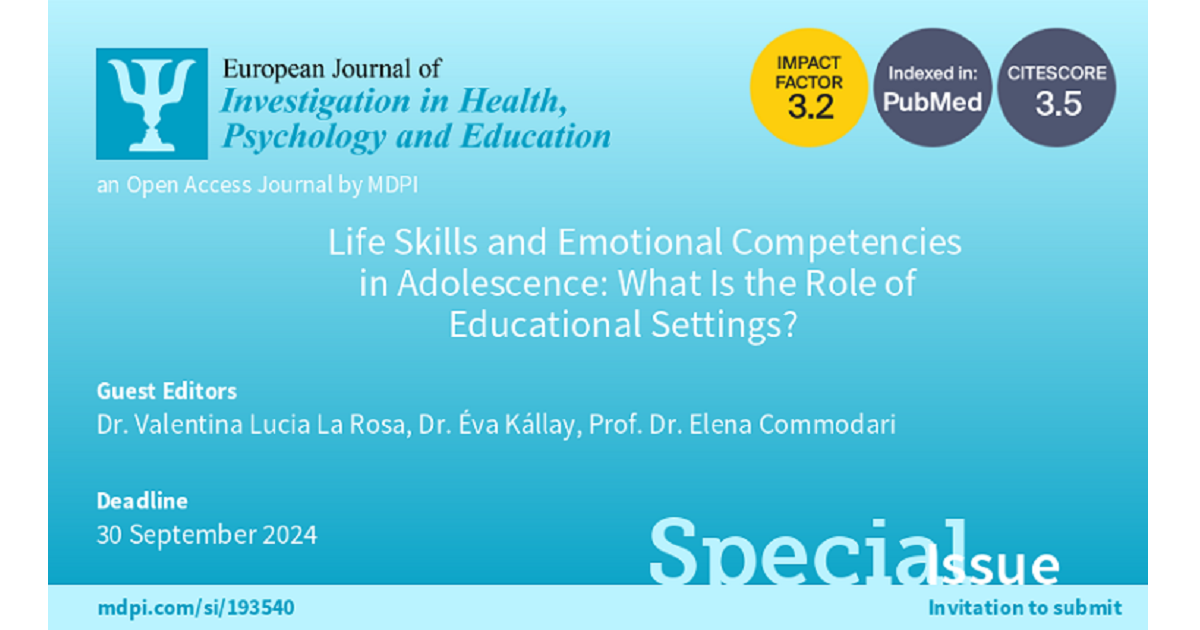Life Skills and Emotional Competencies in Adolescence: What Is the Role of Educational Settings?
A special issue of European Journal of Investigation in Health, Psychology and Education (ISSN 2254-9625).
Deadline for manuscript submissions: 30 September 2024 | Viewed by 275

Special Issue Editors
Interests: developmental psychology; educational psychology; life cycle psychology; development in adolescence; attachment relationships; family; learning and quality of educational settings
Special Issues, Collections and Topics in MDPI journals
Interests: educational psychology; health promotion; development of emotional and social competence in children and adolescents
Interests: emotion recognition; attention; pregnancy; attachment; learning disorders; mental imagery; COVID-19 consequences
Special Issues, Collections and Topics in MDPI journals
Special Issue Information
Dear Colleagues,
Adolescence is a crucial stage of human development when individuals undergo significant changes in multiple domains, including cognitive, social, emotional, and physical. During this period, adolescents face a range of developmental tasks that require them to acquire new skills and competencies. Educational settings play a vital role in facilitating the acquisition of these skills and promoting adolescent development.
This Special Issue aims to explore the skills and competencies that adolescents need to develop to positively address the developmental tasks of this unique life cycle stage, providing a specific focus on the role of educational settings. Potential topics include the following:
- The role of education in developing adolescents’ cognitive competencies, such as critical thinking, problem-solving, and decision-making;
- The impact of social/emotional learning programs on developing emotional regulation, empathy, and relationship skills in adolescence;
- The use of technology in promoting adolescent skill development;
- The role of educational settings in facilitating the development of life skills in adolescence;
- The role of cultural and contextual factors in shaping the acquisition of life skills in adolescents;
- The impact of teacher–student relationships on developing skills and competencies in adolescence;
- The use of experiential learning approaches in promoting skill development in adolescence;
- The role of peer relationships in shaping the development of life skills and emotional competencies;
- The impact of family on the development of adolescent skills and competencies.
Dr. Valentina Lucia La Rosa
Dr. Éva Kállay
Prof. Dr. Elena Commodari
Guest Editors
Manuscript Submission Information
Manuscripts should be submitted online at www.mdpi.com by registering and logging in to this website. Once you are registered, click here to go to the submission form. Manuscripts can be submitted until the deadline. All submissions that pass pre-check are peer-reviewed. Accepted papers will be published continuously in the journal (as soon as accepted) and will be listed together on the special issue website. Research articles, review articles as well as short communications are invited. For planned papers, a title and short abstract (about 100 words) can be sent to the Editorial Office for announcement on this website.
Submitted manuscripts should not have been published previously, nor be under consideration for publication elsewhere (except conference proceedings papers). All manuscripts are thoroughly refereed through a single-blind peer-review process. A guide for authors and other relevant information for submission of manuscripts is available on the Instructions for Authors page. European Journal of Investigation in Health, Psychology and Education is an international peer-reviewed open access monthly journal published by MDPI.
Please visit the Instructions for Authors page before submitting a manuscript. The Article Processing Charge (APC) for publication in this open access journal is 1400 CHF (Swiss Francs). Submitted papers should be well formatted and use good English. Authors may use MDPI's English editing service prior to publication or during author revisions.
Keywords
- adolescence
- development
- life skills
- psychological well-being
- emotional competencies
- educational settings








